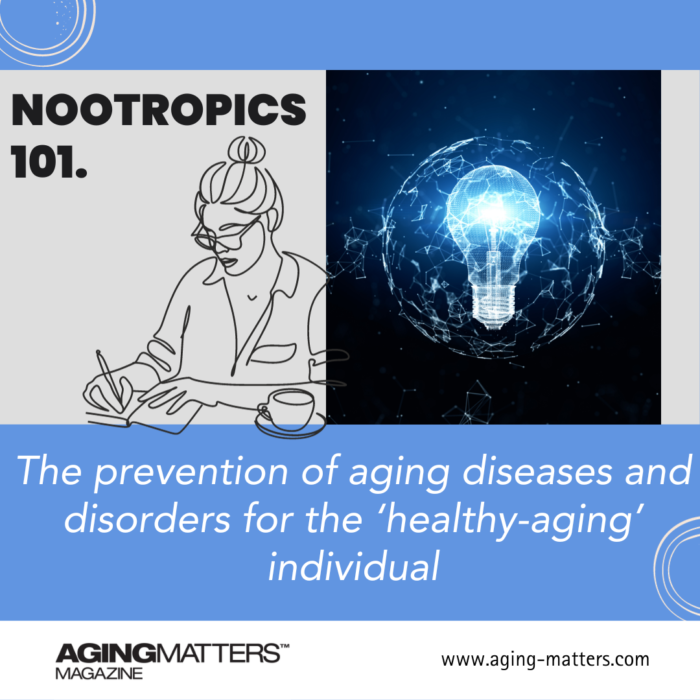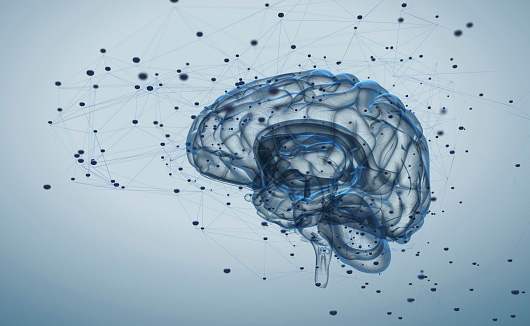
Nootropics 101 – What they are and what they do
November 8th, 2023Nootropics, often referred to as “smart drugs” or cognitive enhancers, are a class of substances that aim to improve cognitive function, including memory, creativity, motivation, and overall mental performance. Nootropics work in different ways but all have the common goal of positively influencing brain function as well as enhancing other areas of the body.
There are a range of options available; please see these below:
Piracetam
Known as the world’s “first smart drug”, Piracetam is part of the ‘racetam’ family of drugs which come under the label of ‘nootropics’. It was originally introduced in the 1960s as a treatment for motion sickness, but clinical trials also showed upturn in cognitive functions.
Piracetam acts as a cognitive enhancer, primarily to enhance memory, learning and attention span. It is available in both syrup and tablet form, offering benefits for sufferers of conditions such as Alzheimer’s disease, dementia and stroke, as well as the more general “age related memory impairment”.
Piracetam is non-toxic and non-addictive. However, users may require higher dosages than other, more potent nootropics.
Aniracetam
Aniracetam is also part of the ‘Racetam family’ of drugs. Like Piracetam, it works primarily to improve memory and mental power, but unlike Piracetam, it has higher AMPA receptor enhancing effects – these receptors are those that researchers think will aid mental concentration and enhancement. It is classed as more potent and has also seen success in reducing feels of depression or anxiety.
In terms of chemical make up, Aniracetam is fat-soluble, whereas Piracetam is water-soluble. This means that Aniracetam may have a shorter half-life than Piracetam, which has a long half life in the brain.
Aniracetam users have reported a range of mild side effects, so it is best to thoroughly research before making a decision to take this smart drug.
Centrophenoxine
Centrophenoxine is well known to enhance memory recall speed, and has seen good effects on those suffering with senile dementia, Alzheimer’s disease, memory problems and cognitive decline. Those who suffer with ADHD have also reported good effects when using Centrophenoxine in terms of symptom control. It is also known by the names “Lucidril” or “meclofenoxate”.
Centrophenoxine works by reducing the levels of lipofuscin in the brain and cells; these levels indicate a Potassium build up over a normal life time but do reduce the functionality of body cells. By reducing these levels, cellular function is restored which in turn helps with memory recall as well as brain power, longevity and mental altertness.
Centrophenoxine use has been associated with excess acetylcholine levels. If this happens, side effects such as headaches, nausea and sleeplessness can occur. If this happens, a lower dose should be trialled and then a stop altogether if side effects do not reduce.
Modafinil
Modafinil is a ‘eugeroic drug’ – this simply means, “good arousal”. It sits in this class alongside Adrafinil; both are classed as mood-brightening psychostimulants that aid memory, wakefulness and vigilance. Some compare the effects of eugeroic drugs to those of amphetamines but their pharmacological profiles are very difference, offering stimulation only when required.
Modafinil is included in the Nootropics list due to its ability to aid memory, brighten mood and induce wakefulness. It is used clinically in the treatment of Narcolepsy (uncontrollable daytime sleepiness) and has also been trialled on individuals suffering from other neurological complaints such as Alzheimer’s, depression, cognitive impairment, age related memory decline and more.
Modafinil has been associated with a range of side effects; it is best to thoroughly research these before taking Modafinil.
Adrafinil
Adrafinil, alongside Modafinil, is a ‘eugeroic drug’ that is known to be a stimulant. It is similar to Modafinil but more potent and can have harder side effects on the body. These include high blood pressure and irregular heartbeat; anyone with a preexisting heart condition should not take Adrafinil.
Adrafinil enhances attention and awareness, without any risk of sleep loss. In this way, it has been used effectively for many years as a treatment for Narcolepsy.
Adrafinil builds up in the body over time, enhancing mental clarity, increased energy levels, alertness, memory and concentration.
Deprenyl
Deprenyl is a smart drug available in both liquid and tablet form; the latter introduced relatively recently to offer an alternative way in which to take this nootropic. Taking Deprenyl boosts dopamine levels in the brain, which means it has been approved for use in the treatment of Parkinson’s Disease. It has also seen success in treating conditions such as MS, Alzheimer’s disease and MS due to its lucidity boosting properties.
Taking Deprenyl supplements can lead to a few known side effects, although not in every individual who takes it. The most common include twitches but less commonly effects such as blurred vision, dry mouth, headaches or irritatibility have been reported.
Vinpocetine
Vinpocetine is a nootropic known for its aid in treating cognitive impairment. It also has anti-inflammatory, antioxidant, anti-coagulant and alagesic properties, although research into these is still ongoing.
Vinpocetine has been used as a nootropic for over 25 years; it acts as a vasodilator by widening the blood vessels in the body. This in turn helps to improve blood flow, which in turn helps brain blood flow. However increased blood flow around the body also helps other areas such as the eyesight and hearing.
Side effects of Vinpocetine are typically mild, including headaches, flushing and nausea.
Hydergine®
Hydergine® is a smart drug derived from the wheat Rye. It is also known as codergocrine mesylate, codergocrine or hydergina Novartis and sits along some of the most potent nootropics as a very useful smart drug in aiding brain power.
Hydergine® works to increase oxygen to the brain; this then works to elevate brain power and rejuvenate the brain cells on a micro-cellular level. When brain cells work effectively, this then actively increases intelligence and mental ability.
Hydergine® has been seen to have few side effects, especially in cases where the dosage levels are raised incrementally over a long period of time. However, when taken in high dosages, some minor side effects such as headaches or mild nausea can occur.
Picamilone
Picamilone is a smart drug hailed as a treatment for depression that works without causing sleepiness or lethargy. It is also known for its anti-anxiety properties.
Picamilone works to help increase blood flow and circulation to the brain; this in turn aids stress and boosts mental prowess. Tests have shown that the way it works, as a vasodilator, exceeds that of Hydergine and Vinpocetine.
Side effects of Picamilone reported include headaches, dizziness and nausea, however these are rare.





